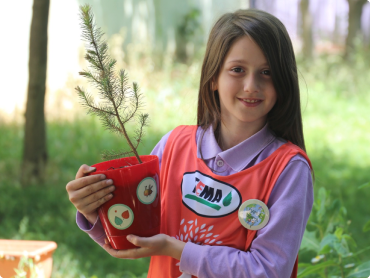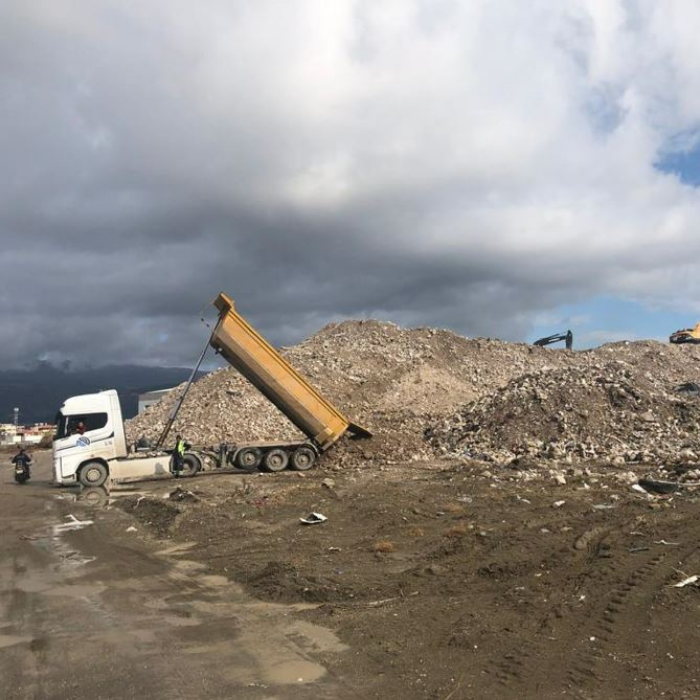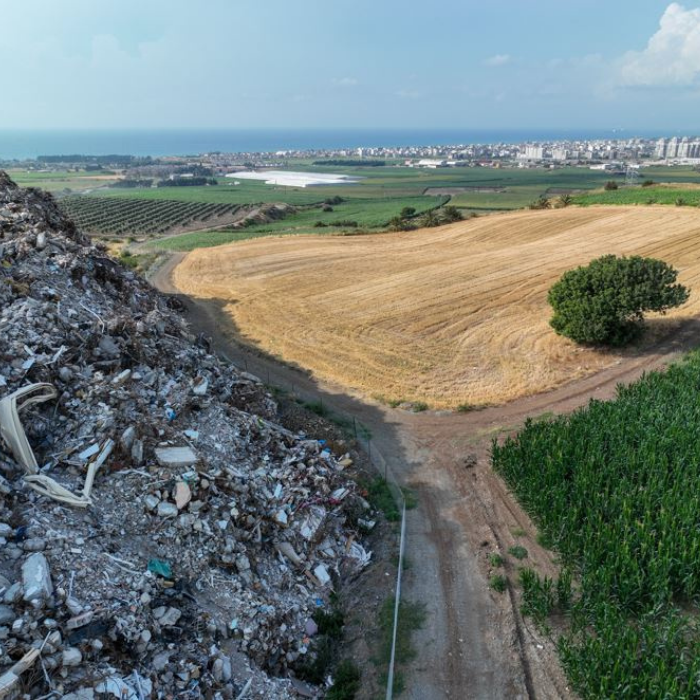TEMA Foundation, which carried out studies in Hatay after the Kahramanmaraş-centered earthquakes that deeply affected Türkiye, shared its striking results with the public on the 1st anniversary of the earthquake. According to the results, asbestos, heavy metal and bacteriological contamination, which has the risk of causing serious public health problems such as epidemics and cancer, were detected in samples taken from soil and water bodies in Hatay. Rubble removal work was carried out in Hatay after the earthquake.
TEMA Foundation initiated a study in Hatay, one of the provinces where the most destruction occurred, to determine the pollution on soil and water caused by the rubble waste due to the earthquakes hitting the city on February 6. Centered in Kahramanmaraş, the earthquake caused destruction in 11 provinces and tens of thousands of casualties. Within the scope of the study, soil and water samples were taken during visits to Hatay in June, September and December 2023 and asbestos, heavy metal and bacteriological analyses were performed.
Asbestos, heavy metal and bacteriological contamination detected
Providing information about the study, Ms. Deniz Ataç, Chairperson of TEMA Foundation said, “Asbestos was detected in 5 of the 7 samples we took from the rubbles dumped at different points in Hatay and from the soil in the fields and gardens nearby. In addition, asbestos was found in 2 of the 3 samples taken from the Mileyha Bird Sanctuary Wetland located on the Samandağ seaside and from the well water in Antakya Serinyol. Bacteriological growth was detected in 3 water samples we took from Güneysöğüt, Samandağ and Serinyol districts. These results show the possibility of sewage water being mixed into the water used in Hatay. This can lead to poisoning and epidemics. Again, in the water samples we took from the vicinity of Defne and Samandağ Mileyha Bird Sanctuary, the amounts of some heavy metals were determined according to the Regulation on Water for Human Consumption. It was determined that the amounts were well above the thresholds set by the Regulation. For this reason, we are concerned about public health."
Asbestos and heavy metals can cause serious diseases
Reminding that asbestos is listed among the main causes of cancer by the World Health Organization (WHO) and the International Agency for Research on Cancer (IARC), Deniz Ataç said, “The high amount of asbestos fibers spread around by the collapse of buildings during and after the earthquake pose a serious danger to public health. Unfortunately, as a result of asbestos measurements previously made by some civil society organiations, asbestos levels in the air were found to be much higher than the thresholds. It is known that when asbestos is taken into the human body, especially through inhalation, it causes serious diseases such as lung fibrosis, lung and laryngeal cancer. Although there is no definitive conclusion as to whether it causes cancer when taken into the body through digestion, there are also studies indicating that it may cause cancer."
Stating that asbestos is not the only factor that threatens public health in Hatay, Ataç said, “There are also poisonous gases emitted into the air from piles of rubble, inorganic and chemical wastes found in dust and microbiological wastes mixed into water.” Drawing attention to other factors, she stated “The most dangerous of these are heavy metals. When some heavy metals accumulate in water and soil, it may cause health problems such as neurological damage, kidney failure and cancer."
Agricultural productivity may decrease by 30% in Hatay
Drawing attention to the danger on agricultural productivity, Ataç said, “Dumping rubble wastes near agricultural lands and mixing the countless varieties of pollutants into the soil, as well as the accumulation of asbestos and dust in the air on plants and preventing them from photosynthesis, will adversely affect the soil and agricultural productivity. In addition to asbestos and dust, various chemicals in rubble waste also pose the danger of negatively affecting soil organisms, soil quality and productivity. For this reason, scientists expect agricultural productivity to decrease by approximately 30%.” Ataç also underlined that these chemicals have the possibility of reaching drinking water and tables through the food chain.
Amik Plain, olive groves and Mileyha Bird Sanctuary should be protected
Emphasising that the pollution in Hatay not only threatens human health, Ataç said, "Amik Plain, which has very fertile soil thanks to the alluviums carried by the Asi River and spreads over approximately 105 thousand hectares, was affected by soil and water pollution caused by irregular waste disposal after the earthquake. In addition to Hatay's valleys and stream beds, which are home to rich vegetation and various wildlife, the olive groves in the areas fed by the systems are among the areas affected by pollution. An area near Mileyha Bird Sanctuary, which is home to 283 of the 500 different bird species in Türkiye, 231 plant species, 24 butterflies, 3 frogs, 12 reptiles and 6 mammal species, has been turned into a rubble dump area. Hundreds of birds come here at every time of the year to rest, feed and breed in summer. Urgent measures should be taken to prevent this area, which gained official status in 2021, from disappearing with eyes open. These areas, which are very important for the natural life and biodiversity of the region, should be protected."
Earthquakes should not lead to secondary disasters!
Reminding the fact that Türkiye is an earthquake country, Deniz Ataç stated that post-disaster management is also very important to prevent earthquakes from causing secondary disasters, and therefore provincial disaster waste plans should be developed urgently.
Ataç said, “Undoubtedly, the biggest measure that can be taken against earthquakes is to build earthquake-resistant buildings suitable for the ground and to strengthen the existing building stock. In this way, it will be possible to reduce the number of grievous losses we have experienced so far. In order to prevent the damage that millions of tons of rubbles will generate after the earthquake to the environment and human health, in addition to provincial disaster management plans, provincial disaster waste plans should be developed, shared with the public and implemented in the post-disaster period. In these plans, strict rules should be introduced regarding where rubble waste will not be dumped in order to protect our important natural assets such as forest areas, wetlands, agricultural lands and pastures."
On the anniversary of the February 6 earthquakes, she once again reiterated her condolences and wishes for a speedy recovery to the relatives of the citizens who lost their lives, everyone affected by the earthquake and the whole country.
We are raising hope! TEMA Foundation





